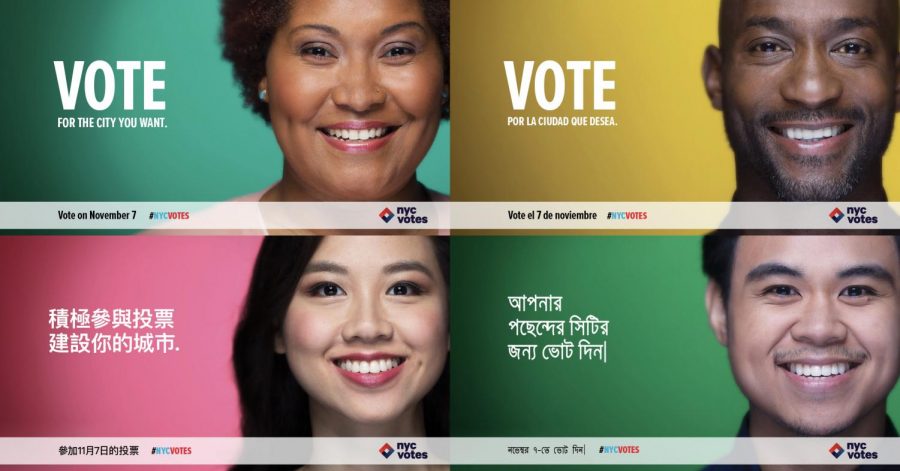Students Campaign for Change
Campaign ads encouraging New Yorkers to vote in the local elections were displayed all around the city, especially on the subway.
November 6, 2017
Hillary Clinton brought two NYU students closer to local politics through her defeat in the 2016 presidential election.
For Silver senior Sophie Majteles, the loss was a firsthand experience. Clinton’s 2016 presidential run was the first campaign for which Majteles volunteered and interned. She was then inspired to work for Christopher Martes’ campaign for city councilmember for District 1, which covers Lower Manhattan.
“Though the outcome [in the Clinton campaign] obviously wasn’t what we hoped for,” Majteles said. “I absolutely loved the experience of working for a campaign and realized I wanted to keep doing it.”
In LS sophomore Jenny Qiu’s case, witnessing Clinton lose the election to President Donald Trump was a wake-up call. Although a few of her own friends volunteered to campaign for Clinton, she decided against volunteering because of both her workload and an assumption that Clinton was going to win. Now, Qiu wants to be an active force in the politics that have the power to affect her and her community by volunteering for Keith Powers’ campaign for city councilmember for District 4.
“The people we elect locally are going to play an even more important role in maintaining the overall quality of life and standing up for those in need of help,” Qiu said.
With the lead up to New York City’s general election, which takes place on Tuesday, both Majteles and Qiu have taken up all the duties required of an intern for a campaign. These include long hours, talking directly to voters and learning about campaign strategy.
Qiu started out entering data into phone banks and assembling canvassing packages. Eventually, after becoming more acquainted with the candidate’s policies, such as his push to reform the Board of Elections by appointing people based on skill rather than political affiliation, her duties progressed into more substantial ones. She was assigned to different projects and helped staff events.
“Working on the campaign is such a hands-on experience in that you know the work you do can directly affect the results of the election,” Qiu said. “As an intern, you aren’t kept in the dark or assigned to meaningless busy work.”
During her time speaking directly to voters, Qiu learned their concerns about the government that rules their day-to-day lives.
“I can definitely see that [New York] city council still has a lot of work to do; one of the major issues is the lack of transparency,” Qiu said. “At least in [New York City], local elected officials are making the effort to push for a cleaner government so that constituents can trust that their elects have their best interests in mind.”
As a member of Marte’s campaign staff, Majteles was in charge of managing volunteers and implementing a mail outreach effort, where she and other volunteers hand wrote thousands of personalized letters and postcards to residents in District 1.
After Marte lost the Democratic primary on Sept. 12 — although he still plans to run for the District 1 councilmember seat on Nov. 7 on the Independence Party line — Majteles concluded her internship.
“I liked being involved with a local election because you see everything so up close,” Majteles said. “You understand how much weight each vote carries and you see how much of our daily lives are shaped by the work of local elected officials — city councils, school boards, mayors [and] state legislators.”
Both Majteles and Qiu have career interests relating to their intern experiences. Majteles wants to go into public policy and community organizing, while Qiu hopes to attend law school after graduating. But both agree that working for a campaign is an experience everyone should undertake — community organizer, lawyer or otherwise.
“Not to be cliche, but the entire point of democracy is that it’s about all of us,” Majteles said. “Local government affects everybody. We all should have a sense of what’s going on in our local politics and we should feel responsible for it, like we have a stake in it.”
A version of this article appeared in the Monday, Nov. 6 print edition. Email Chelsey Sanchez at [email protected].










































































































































